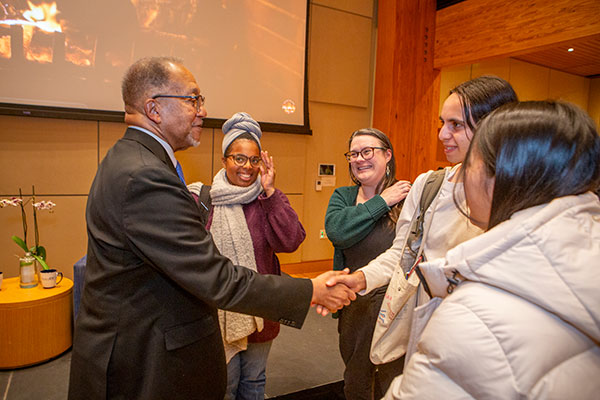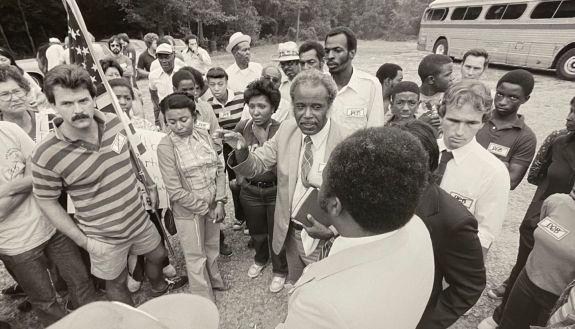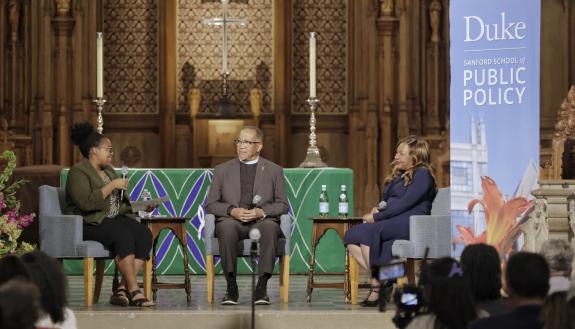Benjamin Chavis on Building Community With Equity and Environmental Justice
Inaugural environmental justice and racial equity fellow speaks on why the movement can help change America


“I don’t think anyone is born a racist,” Chavis added. “I think they become racist because of miseducation, because of mis-socialization, and the basis of racism is really ignorance. We don’t know each other.”
Chavis first commanded global attention in 1971 as a member of the Wilmington Ten – a group of civil rights activists unjustly imprisoned in the wake of a Wilmington riot. He earned a master’s degree from Duke Divinity School and graduated with honors while serving a 34-year prison sentence.
Chavis recalled riding in a prison van that parked in front of Duke Chapel each day to drop him off to attend classes.
“But then the prison bus would come back and pick me up, take me back to Hillsborough Prison,” he said.
Amnesty International declared the Wilmington Ten were political prisoners and in 1978 former North Carolina governor Jim Hunt commuted their sentences. Although Hunt did not pardon the civil rights activists, they were released from prison in 1979.
Chavis and fellow Wilmington Ten members were pardoned on Dec. 31, 2012, by North Carolina governor Beverly Perdue, who said the wrongfully convicted Wilmington Ten’s sentences were “tainted by naked racism.”
To Watch the Event
In 1982, Chavis became one of the nation’s most consequential civil rights leaders when he was one of 500 people jailed soon after he led residents of impoverished, rural Warren County in six weeks of protests over the state’s decision to dump 40,000 cubic yards of soil contaminated with a cancer-causing chemical in one of the county’s Black communities.
While sitting in a Warren County jail cell, Chavis coined the term, “environmental racism,” and a movement was born.
Monday’s fireside chat was fortuitous. Chavis celebrated his 76th birthday and lamented the passing of Martin Luther King Jr.’s youngest son, Dexter.
The former Robert J. Vlasic Dean of Engineering at the University of Michigan, Gallimore had a successful career at Michigan spanning more than three decades. Chavis talked about the importance of Gallimore’s arrival at Duke on July 1.

“It's great to see a brother like you in this place,” he told Gallimore, who is African American. “Duke seems to be in a better place when it comes to diversity, equity and inclusion. Not perfect, but it is in a better place. And when I learned you were the provost, I thought, ‘man, I got to go back to Duke.’”
Gallimore credited Chavis’s pioneering activism for creating better opportunities for people of color, and other traditionally underrepresented groups.
Chavis is Duke’s inaugural Environmental Justice and Racial Equity Fellow. The 2024 fellowship recognizes Chavis’s contributions in teaching, research and service and connects his expertise with Duke’s strategic goals to address climate change and racial equity.
“There really isn't anyone I could think of who would be in a better position to bridge our university's intellectual priorities, but more importantly, in a way that acknowledges what we're trying to do and are doing in the notion of addressing racism and inequality in general in the context of the climate crisis as well,” Gallimore said.
Gallimore also noted the diverse, multi-racial, intergenerational gathering for the fireside chat and described it as “a diverse reflection of our community.”
“If you ask, ‘What race are you?’ You are part of the human race. If you say you're something else, you are part of a concoction. You are part of a deliberate attempt to characterize people in hierarchies to justify the economic exploitation and oppression of those peoples.”
Benjamin Chavis Jr.
He asked Chavis how does the Duke community address the opposition to diversity, exploration, teaching and learning, and the rise of tribalism and anti-intellectualism?
“The rise of racism, the rise of anti-Semitism, the rise of hatred, the rise of anti-intellectualism has a deep root,” Chavis replied.
“If you ask, ‘What race are you?’ You are part of the human race,” Chavis added. “If you say you're something else, you are part of a concoction. You are part of a deliberate attempt to characterize people in hierarchies to justify the economic exploitation and oppression of those peoples.”
Read More about Benjamin Chavis


